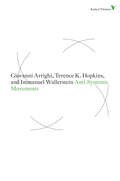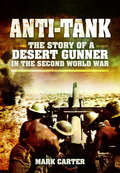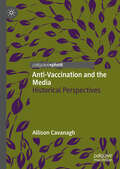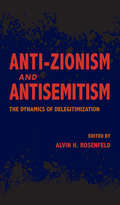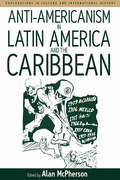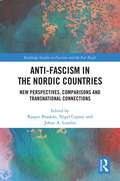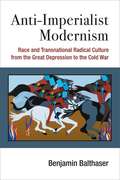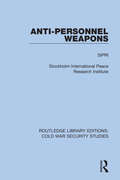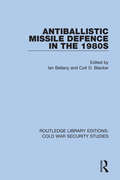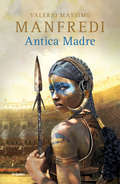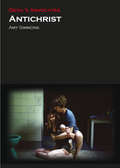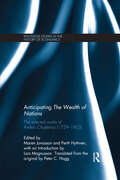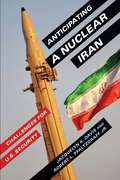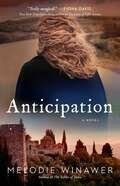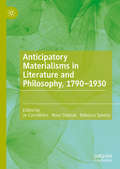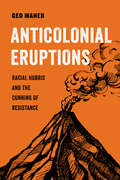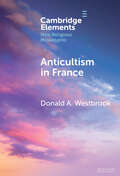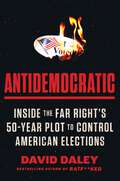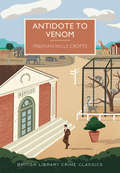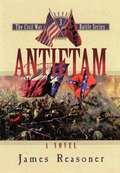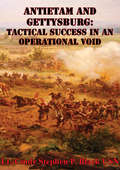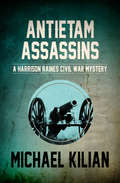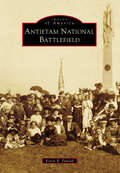- Table View
- List View
Anti-Systemic Movements
by Giovanni Arrighi Terence K. Hopkins Immanuel WallersteinBuilding on an analysis of the dissenting movements to have emerged since the rise of modern capitalism, Anti-Systemic Movements uncovers an international groundswell of resistance still vitally active at the end of the twentieth century. The authors suggest that the new assertiveness of the South, the development of class struggle in the East and the emergence of rainbow coalitions in various regions hold fresh promise for emancipatory politics. Taking the year 1968 as a symbolic turning point, the authors argue that new anti-systemic movements have arisen which challenge the logic of the capitalist world-system.
Anti-Tank: The Story of a Desert Gunner in the Second World War
by Mark CarterA combat memoir by a British Royal Artillery soldier recounting the fight against Rommel&’s panzers, conveyed with wit and vivid detail. This is a vivid and perceptive insight into the horrors of war as experienced by British soldiers of the Royal Artillery in the Desert War in 1941 and 1942. The author, who fought in the campaign, brings to life the true nature of the fighting as British gunners struggled to defend their comrades from the armored power of the Axis forces under Erwin Rommel. Here, too, are some of the lighter sides of war and the friendships that were made in those days of adversity. Anti-Tank takes us from the fighting of 1941 and the to-and-fro of the Benghazi Stakes through to the final Battle of El Alamein in October/November 1942—and the beginning of Eighth Army&’s advance to victory.
Anti-Vaccination and the Media: Historical Perspectives
by Allison CavanaghThis book explores narratives of vaccine hesitancy using samples from the UK press, and looks at the ways these have changed between the 1950s and the present. The work draws on a variety of research instruments including semantic network analysis and analysis of metaphor to provide a rich description of anti-vaccine narratives in different historical periods. The work considers the ways that concerns about and resistance to inoculation were informed by cultural and social pressures in two case studies, firstly that of polio in the 1950s and secondly the so called ‘pertussis crisis’ of the 1970s, wherein a period of social activism and newspaper campaigning led UK and US governments to offer compensation schemes for vaccine damaged children. The studies chosen provide a detailed comparison of the politics of childhood inoculation over two eras in the UK. Chapters also cover the use of metaphor and representational analysis in health communication, comparing ways in which the work of Moscovici, Sontag and other theorists can be used to provide complementary insights, and the affordances and concerns around the use of ‘big data’ analyses in historical work. The work also features discussion of the implications of the findings for approaches to more recent vaccination crisis points. This book argues that anti-vaccination narratives, far from showing a stable and coherent set of concerns, are highly mutable. The work compares anti-vaccination and conspiracy theory narratives, drawing out areas of continuity and schism.
Anti-Zionism and Antisemitism: The Dynamics of Delegitimization (Studies in Antisemitism)
by Edited by Alvin H. RosenfeldSeventeen essays by scholars examining the links between anti-Semitism and attitudes toward Israel in the current political climate.How and why have anti-Zionism and antisemitism become so radical and widespread? This timely and important volume argues convincingly that today’s inflamed rhetoric exceeds the boundaries of legitimate criticism of the policies and actions of the state of Israel and conflates anti-Zionism with antisemitism. The contributors give the dynamics of this process full theoretical, political, legal, and educational treatment and demonstrate how these forces operate in formal and informal political spheres as well as domestic and transnational spaces. They offer significant historical and global perspectives of the problem, including how Holocaust memory and meaning have been reconfigured and how a singular and distinct project of delegitimization of the Jewish state and its people has solidified. This intensive but extraordinarily rich contribution to the study of antisemitism stands out for its comprehensive overview of an issue that is both historical and strikingly timely.
Anti-americanism In Latin America And The Caribbean
by Alan McphersonWhether rising up from fiery leaders such as Venezuela's Hugo Chavez and Cuba's Fidel Castro or from angry masses of Brazilian workers and Mexican peasants, anti U.S. sentiment in Latin America and the Caribbean today is arguably stronger than ever. It is also a threat to U.S. leadership in the hemisphere and the world. Where has this resentment come from? Has it arisen naturally from imperialism and globalization, from economic and social frustrations? Has it served opportunistic politicians? Does Latin America have its own style of anti Americanism? What about national variations? How does cultural anti Americanism affect politics, and vice versa? What roles have religion, literature, or cartoons played in whipping up sentiment against 'el yanqui'? Finally, how has the United States reacted to all this? This book brings leaders in the field of U.S. Latin American relations together with the most promising young scholars to shed historical light on the present implications of hostility to the United States in Latin America and the Caribbean. In essays that carry the reader from Revolutionary Mexico to Peronist Argentina, from Panama in the nineteenth century to the West Indies' mid century independence movement, and from Colombian drug runners to liberation theologists, the authors unearth little known campaigns of resistance and probe deeper into episodes we thought we knew well. They argue that, for well over a century, identifying the United States as the enemy has rung true to Latin Americans and has translated into compelling political strategies. Combining history with political and cultural analysis, this collection breaks the mold of traditional diplomatic history by seeing anti Americanism through the eyes of those who expressed it. It makes clear that anti Americanism, far from being a post 9/11 buzzword, is rather a real force that casts a long shadow over U.S. Latin American relations.
Anti-fascism in the Nordic Countries: New Perspectives, Comparisons and Transnational Connections (Routledge Studies in Fascism and the Far Right)
by Nigel Copsey Kasper Braskén Johan A. LundinAlthough the Nordic countries have a reputation for tolerance and social democracy, they were not immune to fascism which spread across Europe in the 1920s and 1930s. This book offers the first comprehensive history of anti-fascism in the Nordic Countries. Through a number of case studies on anti-fascism in Sweden, Finland, Norway, Denmark and Iceland, the book makes a significant contribution to the history of contentious politics in the Nordic Countries and to our broader knowledge of European fascism and anti-fascism. The case studies concentrate on the different manifestations of resistance to fascism and Nazism in the interwar era as well as some of the postwar variants. The book will be of considerable interest to scholars of anti-fascism as well as researchers of Nordic and Scandinavian history and politics.
Anti-imperialist Modernism: Race And Transnational Radical Culture From The Great Depression To The Cold War
by Benjamin BalthaserAnti-Imperialist Modernism excavates how U. S. cross-border, multi-ethnic anti-imperialist movements at mid-century shaped what we understand as cultural modernism and the historical period of the Great Depression. The book demonstrates how U. S. multiethnic cultural movements, located in political parties, small journals, labor unions, and struggles for racial liberation, helped construct a common sense of international solidarity that critiqued ideas of nationalism and essentialized racial identity. The book thus moves beyond accounts that have tended to view the pre-war "Popular Front" through tropes of national belonging or an abandonment of the cosmopolitanism of previous decades. Impressive archival research brings to light the ways in which a transnational vision of modernism and modernity was fashioned through anti-colonial networks of North/South solidarity. Chapters examine farmworker photographers in California's central valley, a Nez Perce intellectual traveling to the Soviet Union, imaginations of the Haitian Revolution, the memory of the U. S. -Mexico War, and U. S. radical writers traveling to Cuba. The last chapter examines how the Cold War foreclosed these movements within a nationalist framework, when activists and intellectuals had to suppress the transnational nature of their movements, often rewriting the cultural past to conform to a patriotic narrative of national belonging.
Anti-personnel Weapons (Routledge Library Editions: Cold War Security Studies #3)
by SipriThis book, first published in 1978, analyses the development, uses and effects of conventional anti-personnel weapons such as rifles and machine guns, grenades, bombs, shells and mines. It provides the historical, military, technical and clinical background to the international legal discussions as part of the ongoing efforts to prohibit or restrict the uses of some of the more inhumane and indiscriminate of these weapons, the most successful being the 1997 Ottawa Treaty that banned the use of anti-personnel mines.
Antiballistic Missile Defence in the 1980s (Routledge Library Editions: Cold War Security Studies #2)
by Ian Bellany; Coit D. BlackerThis book, first published in 1983, analyses the technical and political developments in the two decades after the 1972 Soviet-American ABM treaty. It signposts the route for discussion of the antiballistic missile question – with its shared tacit assumption that nuclear war is for deterring and not fighting – and examines the dangerous tendency to conduct the ABM debate of the 1980s with the technical and political assumptions of the 1960s.
Antica Madre
by Valerio Massimo ManfrediLa mítica expedición a las fuentes del Nilo en la Roma imperial de Nerón. Numidia, año 62 d.C. El centurión veterano de guerra Furio Voreno encabeza la escolta de una caravana en cuyos carros viajan animales salvajes y seres humanos capturados para luchar en las arenas de la Roma imperial. Entre los cautivos hay una joven llamada Varea. Es orgullosa y salvaje como un felino, puede comunicarse con los animales y Voreno la observa, fascinado. Los retratos de la joven que el pintor de paisajes ha realizado durante el viaje despiertan el interés del emperador por Varea, que al ser rechazado por la chica la envía a la arena. Mientras tanto, Roma se prepara para una de las mayores expediciones de su historia: el emperador Nerón, a sugerencia de su consejero el filósofo Séneca, planea remontar el Nilo en busca de sus fuentes. Será un viaje más allá de los límites del mundo conocido, una gran maniobra militar que extenderá los dominios del imperio. Voreno y Varea participarán en ella. Reseñas:«Cada nuevo libro de Manfredi es sinónimo de acción intensa y fascinante, aventuras de amor y de guerra, sin perder nunca de vista la Historia con mayúsculas.»Giornale di Brescia «La nueva novela de Valerio Massimo Manfredi. Un viaje a Numidia lleva a la captura de una amazona tan bella y fiera como peligrosa, que el centurión Voreno decide salvar.»Il Messaggero «La expedición de Nerón y la guerrera-leopardo.»Il Messaggero «Un relato inspirado en los escritos de Séneca y otros autores.»Giornale di Brescia
Antichrist (Devil's Advocates)
by Amy SimmonsWritten and directed by Lars von Trier, one of the most influential and provocative filmmakers working today, Antichrist (2009), tells a story of parental loss, mourning and despair that result from the tragic death of a child. When the film screened at the 2009 Cannes Film Festival, it split audiences down the middle. <P><P>Some attacked von Trier for misogyny (amongst other things), while others defended him for creating a daring and poetic portrait of grief and separation. Dense, shocking, and thought-provoking, Antichrist is a film which calls for careful analysis and in her Devil's Advocate on the film Amy Simmons follows an account of the film's making with an in-depth consideration of the themes and issues arising from it – the ambiguous depiction of the natural world, the shifting gender power relations, its reflections on Christianity and the limitations of rationality. At the film's heart, says the author, is a heartbreaking depiction of grief-stricken parents, a confounding interplay between psychology and psychosis, misogyny, and empowerment.
Anticipating Balance of Payments Crises The Role of Early Warning Systems
by Catherine A. Pattillo Andrew Berg Gian Maria Milesi-FerrettiA report from the International Monetary Fund.
Anticipating The Wealth of Nations: The Selected Works of Anders Chydenius, 1729–1803 (Routledge Studies in the History of Economics #139)
by Anders ChydeniusThe book consists of eleven of the most important writings of Anders Chydenius, an eighteenth century pioneer of freedom and democracy. Thematically they touch upon subject areas such as the freedom of trade and industry, emigration, the monetary system of the Swedish realm in the eighteenth century, the freedom of the press (or as Chydenius said: the freedom of writing and printing), the freedom of information, the rights of the rural working class and the freedom of religion. The book also includes a comprehensive biography of Chydenius written by Lars Magnusson together with commentaries and explanatory notes to each text.
Anticipating a Nuclear Iran: Challenges for U.S. Security
by Jacquelyn Davis Robert Pfaltzgraff Jr.This volume is based on the assumption that Iran will soon obtain nuclear weapons, and Jacquelyn K. Davis and Robert L. Pfaltzgraff Jr. develop alternative models for assessing the challenges of a nuclear Iran for U.S. security. Through three scenario models, the book explores the political, strategic, and operational challenges facing the United States in a post–Cold War world. <P><P>The authors concentrate on the type of nuclear capability Iran might develop; the conditions under which Iran might resort to threatened or actual weapons use; the extent to which Iran's military strategy and declaratory policy might embolden Iran and its proxies to pursue more aggressive policies in the region and vis-à-vis the United States; and Iran's ability to transfer nuclear materials to others within and outside the region, possibly sparking a nuclear cascade. Drawing on recent post–Cold War deterrence theory, the authors consider Iran's nuclear ambitions as they relate to its foreign policy objectives, domestic politics, and role in the Islamic world, and they suggest specific approaches to improve U.S. defense and deterrence planning.
Anticipation: A Novel
by Melodie WinawerFrom the author of the &“engrossing historical epic&” (Booklist) The Scribe of Siena comes a thrilling tale set in the crumbling city of Mystras, Greece, in which a scientist&’s vacation with her young son quickly turns into a fight for their lives after they cross paths with a man out of time.After the death of her beloved husband and becoming a single parent to her nine-year-old son Alexander, overworked scientist Helen desperately needs an escape. So when Alexander proposes a trip to Greece—somewhere he's always dreamed of visiting—Helen quickly agrees. After spending several days exploring the tourist-filled streets, they stumble upon the ancient city of Mystras and are instantly drawn to it. Its only resident is Elias, a mysterious tour guide living on the city&’s edges…both physically and temporally. In 1237, Elias&’s mother promised his eternal service to the Profitis Ilias in Mystras in exchange for surviving a terrible illness. But during his 800 years of labor, he&’s had one common enemy: the noble Lusignan family. The Lusignan line is cursed by a deadly disease that worsens with each generation, and a prophecy hints that Elias&’s blood is their only hope for a cure. He has managed to survive throughout the centuries, but the line has dwindled down to the last Lusignan and he is desperate to avert his family&’s destiny. When Elias runs into Helen, he meets his match for the first time—but he unwittingly puts both her and her young son in danger as a result. With time running out and an enemy after them, Elias and Helen are forced to choose between the city they love, and each other. Blending the historical romance of Diana Gabaldon, the rich detail of Philippa Gregory&’s novels, and Dan Brown&’s fast-paced suspense, Anticipation is a thrilling and satisfying read like no other.
Anticipatory Materialisms in Literature and Philosophy, 1790–1930
by Jo Carruthers Nour Dakkak Rebecca SpenceAnticipatory Materialisms explores nineteenth and early twentieth-century literature thatanticipates and pre-empts the recent philosophical ‘turn’ to materiality and affect. Critical volumes that approach literature via the prism of New Materialism are in the ascendence. This collection stakes a different claim: by engaging with neglected theories of materiality in literary and philosophical works that antedate the twenty-first century ‘turn’ to New Materialism and theories of affect, the project aims to establish a dialogue between recent theoretical considerations of people-world relations in literature and that which has gone before. This project seeks to demonstrate the particular and meaningful ways in which interactions between people and the physical world were being considered in literature between the nineteenth and early twentieth centuries. The project does not propose an air of finality; indeed, it is our hope that offering provocative and challenging chapters, which approach the subject from various critical and thematic perspectives, the collection will establish a broader dialogue regarding the ways in philosophy and literature have intersected and informed each other over the course of the long nineteenth century.
Anticolonial Eruptions: Racial Hubris and the Cunning of Resistance (American Studies Now: Critical Histories of the Present #15)
by Geo MaherThis incisive study reveals the fundamental, paradoxical weakness of colonialism and the enduring power of anticolonial resistance. Resistance is everywhere, but everywhere a surprise, especially when the agents of struggle are the colonized, the enslaved, the wretched of the earth. Anticolonial revolts and slave rebellions have often been described by those in power as "eruptions"—volcanic shocks to a system that does not, cannot, see them coming. In Anticolonial Eruptions, Geo Maher diagnoses a paradoxical weakness built right into the foundations of white supremacist power, a colonial blind spot that grows as domination seems more complete. Anticolonial Eruptions argues that the colonizer’s weakness is rooted in dehumanization. When the oppressed and excluded rise up in explosive rebellion, with the very human demands for life and liberation, the powerful are ill-prepared. This colonial blind spot is, ironically, self-imposed: the more oppressive and expansive the colonial power, the lesser-than-human the colonized are believed to be, the greater the opportunity for resistance. Maher calls this paradox the cunning of decolonization, an unwitting reversal of the balance of power between the oppressor and the oppressed. Where colonial power asserts itself as unshakable, total, and perpetual, a blind spot provides strategic cover for revolutionary possibility; where race or gender make the colonized invisible, they organize, unseen. Anticolonial Eruptions shows that this fundamental weakness of colonialism is not a bug, but a permanent feature of the system, providing grounds for optimism in a contemporary moment roiled by global struggles for liberation.
Anticultism in France: Scientology, Religious Freedom, and the Future of New and Minority Religions (Elements in New Religious Movements)
by Donald A. WestbrookThis Element introduces readers to the problem of anticultism and antireligious movements in France. The first section offers an overview of anticultism in France, including the paradoxical place of modern French secularism (laïcité) that has shaped a culture prejudiced against minority religions and new religions (sectes or 'cults') and impacted Europe more broadly. This includes state-sponsored expressions, in particular MIVILUDES, an organization funded by the French government to monitor cultic or sectarian deviances. The second section takes up the case of the American-born Church of Scientology, tracing its history in the country since the late 1950s and how it has become a major focus of anticultists in France. The Element concludes with reflections on the future of new and minority religions in France. A timeline provides major dates in the history of anticultism in modern French history, with a focus on items of relevance to Scientology in France.
Antidemocratic: Inside the Far Right's 50-Year Plot to Control American Elections
by David Daley“Chilling and convincing, Antidemocratic is a must-read for anyone seeking to understand American politics in 2024.” —Heather Cox Richardson, author of Democracy AwakeningA riveting yet disturbing history of the fifty-year Republican plot to hijack voting rights in America, its profound implications for the 2024 presidential election, and the crucial role that Chief Justice John Roberts has played in determining how we vote.In 1981, a young lawyer, fresh out of Harvard law school, joined the Reagan administration’s Department of Justice, taking up a cause that had been fomenting in Republican circles for over a decade by that point. From his perch inside the Reagan DOJ, this lawyer would attempt to bring down one of the defining pieces of 20th century legislation—the Voting Rights Act. His name was John Roberts.Over thirty years later in 2013, these efforts by John Roberts and the conservative legal establishment culminated when Roberts, now Chief Justice of the Supreme Court, wrote Shelby County vs. Holder, one of the most consequential decisions of modern jurisprudence. A dramatic move that gutted the Voting Rights Act, Roberts’s decision—dangerously premised on the flawed notion that racism was a thing of the past—emboldened right-wing, antidemocratic voting laws around the country immediately. No modern court decision has done more to hand elections to Republicans than Shelby.Now lauded investigative reporter David Daley reveals the urgent story of this fifty-year Republican plot to end the Voting Rights Act and encourage minority rule in their party’s favor. From the bowels of Reagan’s DOJ to the walls of the conservative Federalist Society to the moneyed Republican resources bankrolling restrictive voting laws today, Daley reveals a hidden history as sweeping as it is troubling. Through careful research and exhaustive reporting, he connects Shelby to a well-funded, highly-coordinated right-wing effort to erode the power of minority voters and Democrats at the ballot box—an effort that has grown stronger with each election cycle. In the process Roberts and his conservative allies have enabled fringe conservative theories about our elections with the potential to shape the 2024 election and topple the foundations of our democracy.Timely and alarming, Daley offers a powerful message that, while Shelby was the misguided end of the Voting Rights Act, it was also the beginning of something far darker.
Antidote to Murder
by Felicity YoungIn the scorching summer of 1911, London is a hotbed of political activity as women fight for their equality and Germany starts to pose a dangerous threat. But Dody McCleland, England's first female autopsy surgeon, has more immediate concerns--such as finding out who's trying to frame her for murder... A distraught scullery maid appears at Dody's Women's Clinic begging for an abortion. It turns out she has a case of lead poisoning, which Dody believes she took to induce a miscarriage. Instead of reporting the girl to the authorities, Dody decides to council her and prescribes an antidote. But days later, the maid is found dead from a bungled criminal abortion--and the coroner receives a series of anonymous letters accusing Dody of the crime. Now, Dody has to find out who has framed her for the maid's murder--or else she'll be embroiled in a criminal trial. Chief Inspector Pike is working undercover on another case, playing the piano for an exotic dancer who may be spying for the Germans, but when he hears Dody's in trouble, he insists on lending a hand. But as Pike and Dody are about to discover, she's not only fighting for her career, but for her life, too...
Antidote to Venom: A British Library Crime Classic (British Library Crime Classics #0)
by Freeman Wills Crofts'Mr Wills Crofts is deservedly a first favourite with all who want a real puzzle’ – Times Literary Supplement 'He always manages to give us something that really keeps us guessing’ – Daily Mirror George Surridge, director of the Birmington Zoo, is a man with many worries: his marriage is collapsing; his finances are insecure; and an outbreak of disease threatens the animals in his care. As Surridge’s debts mount and the pressure on him increases, he begins to dream of miracle solutions. But is he cunning enough to turn his dreams into reality – and could he commit the most devious murder in pursuit of his goals? This ingenious crime novel, with its unusual 'inverted’ structure and sympathetic portrait of a man on the edge, is one of the greatest works by this highly respected author. The elaborate means of murder devised by Crofts’s characters is perhaps unsurpassed in English crime fiction for its ostentatious intricacy. This new edition is the first in several decades and includes an introduction by the award-winning novelist and crime fiction expert Martin Edwards.
Antietam (The Civil War Battle Series, Book #3)
by James Reasoner[From the back cover] Will glanced at the cornfield to his right and saw the hail of bullets cutting through the growth, knocking ears of corn from their stalks and making the plants sway as if a wind were blowing over them. It was a wind of death, thought Will, and that was all he had time to think before the Federals were upon them. He emptied his pistol at almost point-blank range as the leading edge of the Union attack reached the trees. Around him, the men of his company could hold back no longer. With Rebel yells sounding from their throats, they leaped forward, firing their rifles, thrusting with bayonets, slashing with rifle butts. The two sides came together with an audible crash. Grunts of exertion mingled with shrieks of pain. Men who tripped and fell were trampled ruthlessly underfoot by friend and foe alike. Will pulled his saber from its scabbard. His training in its use had been rudimentary at best, but he knew how to hack back and forth with the blade. As he fought, his senses alternated between a heightened awareness and a dull numbness. There were moments that were crystal clear, etched in his memory for the rest of his life: the open, shouting mouth of a Union soldier lunging at him, the bitter stench of powder smoke in his nose, the burning pain of a bullet that grazed his left shoulder and tore his uniform but left only a red mark on his flesh. At other times he seemed surrounded by a fog that pressed in on him so that the figures around him were blurry and the sounds of battle only a distant din. But always he fought, striking out at anyone in a blue uniform. Something brushed his face, and he realized it was a corn tassel. He had stumbled into the field without knowing it. All around him the plants were falling, some of the stalks cut down by flying bullets, others toppled by the bodies of men as they fell, the wounded, the dead, and the dying. Green was splashed with crimson and then crushed into the earth.
Antietam And Gettysburg: Tactical Success In An Operational Void
by Lt.-Cmdr Stephen P. Black USNThe Battles of Antietam and Gettysburg are widely recognized as tactical victories for the Union's Army of the Potomac. Following both battles, however, the respective commanding generals. General McClellan and General Meade, were sharply criticized for having failed to vigorously pursue General Lee and his Army of Northern Virginia in order to deliver a decisive blow. Both Union commanders offered a list of extenuating circumstances, such as battle fatigue, large casualties and lack of supplies, which precluded a "premature" pursuit of General Lee.Upon examination, however, their inability to conceptualize a decisive pursuit of General Lee's army points to a direct failure at the operational level of War. Both Union generals were unable to link their tactical victories to any larger strategic objective. The reasons for this from the strategic confusion of a conflict evolving from limited War to total War, and from the void in operational training that left both McClellan and Meade ill prepared to perform successfully at this critical level of Warfare.Examining this operational void, it becomes apparent that a commander's construct of War must be complete, that is, fully cognizant of the strategic, operational and tactical levels of War, in order to achieve success beyond the limits of the tactical battlefield. Such an examination points to the criticality of the operational level of Warfare, highlights the importance of the commander's concept of operations and suggests that an operational commander must grow in the sense that his cognitive processes must be tuned into the dynamics of his environment, not only on a tactical level, but on the operational and strategic level.
Antietam Assassins (The Harrison Raines Civil War Mysteries #6)
by Michael KilianA Civil War spy is pulled out of retirement to find a killer It's 1862, and for Harrison Raines, the Civil War is finished. Since the First Battle of Bull Run, he has served the Union Army as a spy, crisscrossing the war-torn country and witnessing more death, misery, and carnage than any man should. Although a Virginian, he loathes slavery, and is proud to have served Abraham Lincoln. But Raines has had enough killing, and wishes only to retire to a tranquil patch of land. He acquires a plot in the hills of western Virginia and settles down to the life of the gentleman farmer--but Raines's days will not remain quiet for long. When a local parson known to have Union sympathies is killed, Raines fears his new neighbors may come after him next. To secure a peaceful retirement, he will have to stare down death 1 last time. The Antietam Assassins is the 6th book in the Harrison Raines Civil War Mysteries, but you may enjoy reading the series in any order.
Antietam National Battlefield (Images of America)
by Kevin R. PawlakApproximately 110,000 soldiers of the Union and Confederate armies fought along the banks of Antietam Creek in the bloodiest single-day battle in American history. In 12 hours of fighting, approximately 23,000 men fell, either killed, wounded, or missing, forever scarring the landscape around the town of Sharpsburg. Established as the Antietam Battlefield Site in 1890, Antietam National Battlefield became a National Park Service landmark in 1933. The park grew from 33 acres in the 1890s to encompassing over 3,000 acres today. Some of the Civil War's most recognizable landmarks now sit within its boundaries, including Dunker Church, Bloody Lane, and Burnside Bridge. The events that occurred across the fields and woodlots around Sharpsburg and along Antietam Creek bring hundreds of thousands of visitors to Antietam National Battlefield every year.
